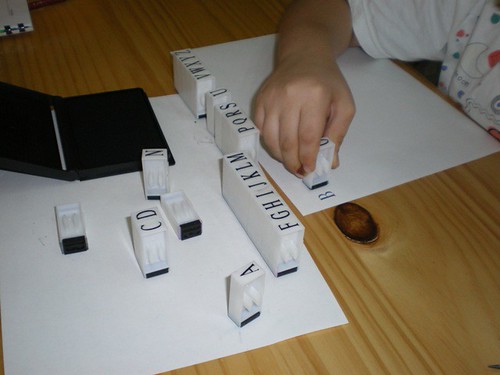"Are round and around (as preposition and adverbial particle) interchangeable in all contexts? In many contexts in British English they are, as in she put her arm round him; she put her arm around him. There is, however, a general preference for round to be used for definite, specific movement (she turned round; a bus came round the corner), while around tends to be used in contexts which are less definite (she wandered around for ages; costing around £3,000) or for abstract uses (a rumour circulating around the cocktail bars).In US English the situation is different. The normal form in most contexts is around; round is generally regarded as informal or non-standard and is only standard in certain fixed expressions, as in all year round and they went round and round in circles."
Tuesday, 5 November 2013
What's the difference between round and around?
Taken from oxforddictionaries.com:
Thursday, 31 October 2013
What Can I Read In My Own Time?
Reading is one of the best ways you can improve your English. Many students have found that it has been very helpful for them, and in this article, it is claimed that reading novels can even make you a better person!
To begin your reading habit, remember to...
Here are some recommendations from teachers around the world. This list is a work in progress, so if you have something you'd like to recommend to other students, let me know and I'll add it to the list.
http://metro.co.uk/
http://tinytexts.wordpress.com/
http://news.yahoo.com/
http://www.newyorker.com/
http://esl-bits.net/
http://www.rong-chang.com/qa2/
http://www.eslfast.com/
http://www.short-stories.co.uk/?cc=ch&selLanguage=en
http://www.onlineflashfiction.com/
http://www.eastoftheweb.com/short-stories/indexframe.html
A Farewell to Arms by Ernest Hemingway
Angela’s Ashes by Frank McCourt
Animal Farm by George Orwell
Boy by Roald Dahl
Breakfast of Champions by Kurt Vonnegut
Bridget Jones’s Diary by Helen Fielding
Cat’s Eye by Margaret Atwood
Fifth Business by Robertson Davies
Going Solo by Roald Dahl
Life of Pi by Yann Martel
Mysteries by Agatha Christie
Of Mice and Men by John Steinbeck
Rendezvous with Rama by Arthur C Clarke
Sherlock Holmes by Sir Arthur Conan Doyle
Short Cuts by Raymond Carver
The Color Purple by Alice Walker
The Concise Chinese Dictionary For Lovers by Xiaolu Guo
The Curious Incident of the Dog in the Night-Time by Mark Haddon
The Handmaid’s Tale by Margaret Atwood
The Joy Luck Club by Amy Tan
The Kite Runner by Khaled Hosseini
The Little Prince by Antoine de Saint-Exupéry
The Old Man and the Sea by Ernest Hemingway.
The Pearl by John Steinbeck
The Secret Life of Bees by Sue Monk Kidd
Things Fall Apart by Chinua Achebe
To Kill a Mockingbird by Harper Lee
Train Dreams by Denis Johnson
For more suggestions for books and websites to read, click here.
Student tips based on: http://extensivereading.net/docs/ERChar.html
To begin your reading habit, remember to...
... read as much as you can.
... read a variety of different texts (books, newspaper articles, blogs) on different subjects.
... only read things that are interesting to you. If you're not enjoying it, stop and read something else.
... read because you want to and because you enjoy it. That should be your only objective, and it should be enough.
... read things that you understand. If it's too difficult, stop and read something else. Try not to use a dictionary too much.
... read when you have some time to yourself, even if it's only for five minutes.
... talk to me and the other students in your class about what you read. Keep us updated on what you are reading. Make recommendations about books and websites that you enjoy.
What Can I Read?
Here are some recommendations from teachers around the world. This list is a work in progress, so if you have something you'd like to recommend to other students, let me know and I'll add it to the list.
News and articles
http://metro.co.uk/
http://tinytexts.wordpress.com/
http://news.yahoo.com/
http://www.newyorker.com/
Books and short stories (online)
http://www.rong-chang.com/qa2/
http://www.eslfast.com/
http://www.short-stories.co.uk/?cc=ch&selLanguage=en
http://www.onlineflashfiction.com/
http://www.eastoftheweb.com/short-stories/indexframe.html
Books
A Farewell to Arms by Ernest Hemingway
Angela’s Ashes by Frank McCourt
Animal Farm by George Orwell
Boy by Roald Dahl
Breakfast of Champions by Kurt Vonnegut
Bridget Jones’s Diary by Helen Fielding
Cat’s Eye by Margaret Atwood
Fifth Business by Robertson Davies
Going Solo by Roald Dahl
Life of Pi by Yann Martel
Mysteries by Agatha Christie
Of Mice and Men by John Steinbeck
Rendezvous with Rama by Arthur C Clarke
Sherlock Holmes by Sir Arthur Conan Doyle
Short Cuts by Raymond Carver
The Color Purple by Alice Walker
The Concise Chinese Dictionary For Lovers by Xiaolu Guo
The Curious Incident of the Dog in the Night-Time by Mark Haddon
The Handmaid’s Tale by Margaret Atwood
The Joy Luck Club by Amy Tan
The Kite Runner by Khaled Hosseini
The Little Prince by Antoine de Saint-Exupéry
The Old Man and the Sea by Ernest Hemingway.
The Pearl by John Steinbeck
The Secret Life of Bees by Sue Monk Kidd
Things Fall Apart by Chinua Achebe
To Kill a Mockingbird by Harper Lee
Train Dreams by Denis Johnson
For more suggestions for books and websites to read, click here.
Student tips based on: http://extensivereading.net/docs/ERChar.html
Thursday, 24 October 2013
English Monstruo
English Monstruo is a mobile app aimed and designed specifically for Spanish speakers interested in improving their English, available for free from Cambridge University Press. If you download it, let me know what you think of it.
http://www.cambridgeapps.org/general/monstruo.html
http://www.cambridgeapps.org/general/monstruo.html
Thursday, 10 October 2013
How To Practice Pronunciation At Home
Here some websites that can help you practice pronunciation...
http://cambridgeenglishonline.com/Phonetics_Focus/
http://www.uiowa.edu/~acadtech/phonetics/#
http://www.manythings.org/e/pronunciation.html
Thursday, 3 October 2013
How To Use Soundcloud
If you want to learn more, Mashable has a great guide to Soundcloud here, although there are a lot of things you don't need to learn to use it successfully.
Sunday, 4 August 2013
Do British people still go speed dating?
Yes they do!
http://www.theguardian.com/uk-news/the-northerner/2013/aug/02/speed-dating-the-happy-meal-of-romance
Some interesting vocabulary
gimmicky -
musical chairs and snap - children's party games
nosey - interested in other people's business
bilge - nonsense, rubbish
a blast - a fun experience
fazed - bothered
Note: This article is written in an informal way, so there is quite a lot of slang and some expressions which is only suitable for very advanced speakers. Don't worry about understanding everything in the article, just get a sense of what her experience was like.
Thursday, 1 August 2013
Which podcasts can I listen to?
This is a list of podcasts designed for English language learners, which is taken from Sandy Millin's blog (with her permission). If you'd like to read more about podcasts, read Sandy's full blog post where she explains what podcasts are, how they work, how you can listen to them, and more examples:
http://independentenglish.wordpress.com/2012/02/14/podcasts/
If you are studying for IELTS, you will find also this list useful:
http://independentenglish.wordpress.com/2013/02/04/ielts-friendly-podcasts/
http://independentenglish.wordpress.com/2012/02/14/podcasts/
If you are studying for IELTS, you will find also this list useful:
http://independentenglish.wordpress.com/2013/02/04/ielts-friendly-podcasts/
FOR ENGLISH LEARNERS
The BBC Learning English page has a range of podcasts designed for English learners of all levels. Each podcast can be downloaded and also has a tapescript so you can read while you listen.
- The English we speak is a series of very short 2-3 minute episodes, each looking at one phrase in English.
- Words in the news introduces vocabulary based on up-to-date news stories. News English Extra looks at the use of words and phrases which often appear in the news.
- Ask about English podcasts answer questions from learners about confusing parts of English. Grammar Challenge helps you with difficult areas of English grammar.
- How to… gives you instructions on how to do lots of different things in English, like congratulate people or complain about something.
- Keep your English up-to-date helps you to understand words which have recently entered the English language.
- Express English asks short questions to Londoners. You can hear their answers, then add your own.
- 6 minute English is like a podcast magazine. Each week, the presenters talk about one topic and teach you vocabulary to help you discuss it too.
The British Council also have various podcasts designed for English learners.
- Elementary Podcasts is designed for elementary learners. It also has activities to help you practise the vocabulary.
- Big City Small World is a story about a group of young people living in London.
- Word on the Street looks at the lives of young British people.
- The Professionals podcasts are designed to help you improve your English for your career and at work.
Other podcasts for English learners include:
- Listen to English has new podcasts every week, each with a transcript and some linked activities. You can listen by clicking the arrow > at the top of the blogpost, or go to the bottom of the post and click ‘Download’.
- Podcasts in English and ESLpod: you can listen to the podcasts for free, but you need to pay if you want to read the transcripts or get activities to do with the podcasts.
- St. George International podcasts: conversations between real English speakers about lots of different aspects of life in the UK.
How do you spell verbs in the past simple?
 |
| Spelling |
https://sites.google.com/site/englishgrammarguide/Home/spelling-rules-for-the-verb-tenses
http://oxforddictionaries.com/words/verb-tenses-adding-ed-and-ing
What are state verbs?
 |
| Thinking... |
"A stative verb is one that describes a state of being, in contrast to a dynamic verb which describes an action. The difference can be categorised by saying that stative verbs are static or unchanging throughout their entire duration, whereas dynamic verbs describe a process that changes over time. Many languages distinguish between these two types in terms of how they can be used grammatically."
For more information and practice, go to:
http://learnenglish.britishcouncil.org/en/grammar-reference/stative-verbs
http://www.perfect-english-grammar.com/stative-verbs.html
http://www.ecenglish.com/learnenglish/lessons/what-are-state-verbs
Subscribe to:
Posts (Atom)


